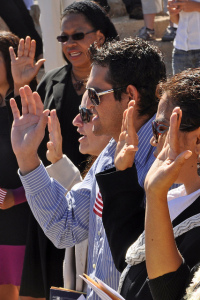
Within 21 days of receiving our Request for Supervisory Review of Immigrant Visa Refusal and Renewed Motion to Reconsider and Rescind Inadmissibility Finding under INA 212(a)(6)(C)(i), the U.S. Consulate removed the lifetime bar and instructed our client to continue the immigrant visa process. Ultimately, he received his Immigrant Visa after the new police certificate and updated proof of his U.S. citizen petitioner’s U.S. domicile and financial support were provided. Because the U.S. Consulate agreed to lift the fraud charge, no Form I-601, Application for Waiver of Inadmissibility, was required.
Born stateless, the applicant used to hold a refugee travel document that contained a visitor visa when he was a child. After he acquired citizenship in a country where he was not born, the applicant used the new passport to obtain a second visitor visa and traveled to the United States for a temporary recreational stay.
Despite being married to a U.S. citizen, he complied with the terms of his visitor visa and did not overstay the authorized period or apply for a marriage-based green card within the United States. Based on the approved Form I-130 immigrant petition filed by his U.S. citizen wife, he sought to become a permanent resident through an Immigrant Visa application at the U.S. Consulate overseas.
At the initial Immigrant Visa interview, the applicant presented his passport for visa stamping. About two months later, the U.S. Consulate conducted a re-interview in which it asked about the process he used to acquire the citizenship and obtain the passport. He explained the legal channels he used to get both. Nonetheless, the U.S. Consulate charged him with section 212(a)(6)(C)(i)(fraud/willful misrepresentation of material fact to gain a U.S. immigration benefit), upon noting it was unable to verify his acquired citizenship or the authenticity of the passport when it contacted the government authorities.
The U.S. Consulate instructed him to file a Form I-601, Application for Waiver of Inadmissibility, to be excused from the inadmissibility charge. A section 212(a)(6)(C)(i) finding prohibits applicants from receiving an Immigrant Visa without first getting an I-601 approval from USCIS.
Two months after the visa refusal, the applicant contacted me for the first time to discuss his options. In our Skype (video) consultation, I explained that one solution was to file a Form I-601 application, as the U.S. Consulate instructed. To receive the waiver, he would need to prove the extreme hardships his U.S. citizen wife would suffer if he is denied entry to the United States as a permanent resident. I noted there is never any guarantee the waiver will be granted due to the high standard of proof and the discretion involved in the decision-making.
I further pointed out that if he did not commit fraud or willfully misrepresent material facts to gain the prior B1/B2 visitor visa, the Immigrant Visa, or any other U.S. immigration benefit, he could file a Motion to Reconsider and Rescind Inadmissibility Finding with the U.S. Consulate. If such a motion is granted and the section 212(a)(6)(C)(i) bar is lifted, the I-601 waiver is not required for the visa to be issued.
The client opted to go with the request to reconsider the inadmissibility charge. After we entered into a representation agreement, I counseled him on the information and documents he needed to present to show he did not engage in fraud or willfully misrepresent material facts to receive any U.S. immigration benefit.
To support the Motion to Reconsider, I prepared a legal memorandum describing how the applicant used proper channels to obtain the passport and why the submission of this passport to the U.S. Consulate was actually immaterial to his eligibility for the Immigrant Visa, as well as the prior visitor visas he received.
Five days after receiving the Motion to Reconsider, the U.S. Consulate issued a response stating the section 212(a)(6)(C)(i) bar would remain and the applicant needed to file for an I-601 waiver. The Consulate noted the applicant had no concrete evidence to support his explanation on how he acquired the citizenship. The Consulate added that during its checks with the government authorities, it was determined beyond reasonable doubt the applicant misrepresented his case and deliberately provided false information and documents to receive an immigration benefit. They added he did not rescind his false statements when given the opportunity to do so.
In the Request for Supervisory Review and Renewed Motion to Reconsider and Rescind Inadmissibility Finding, I stressed the important points the U.S. Consulate missed when it issued the response affirming the section 212(a)(6)(C)(i) charge.
In reply to this Request and Renewed Motion, the U.S. Consulate sent a response 21 days later stating the section 212(a)(6)(C)(i) charge had been lifted. Five months later — following the completion of administrative processing — my client received the Immigrant Visa to join his wife in the United States, without needing to file for and obtain an I-601 waiver.
This is a true success story.
Cheers,
Dyan Williams
Founder & Principal Attorney
Dyan Williams Law PLLC
(612) 225-9900
info@dyanwilliamslaw.com
###
This article provides general information only. It is based on law, regulations and policy that are subject to change. Do not consider it as legal advice for any individual case or situation. Each case is different and case examples do not constitute a prediction or guarantee of success or failure in any other case. The sharing or receipt of this information does not create an attorney-client relationship.

 green card. Becoming a U.S. citizen is generally recommended: you get to vote for elected officials, obtain federal jobs, sponsor immediate relatives for green cards, travel freely with a U.S. passport, and gain immunity from deportation or removal.
green card. Becoming a U.S. citizen is generally recommended: you get to vote for elected officials, obtain federal jobs, sponsor immediate relatives for green cards, travel freely with a U.S. passport, and gain immunity from deportation or removal.